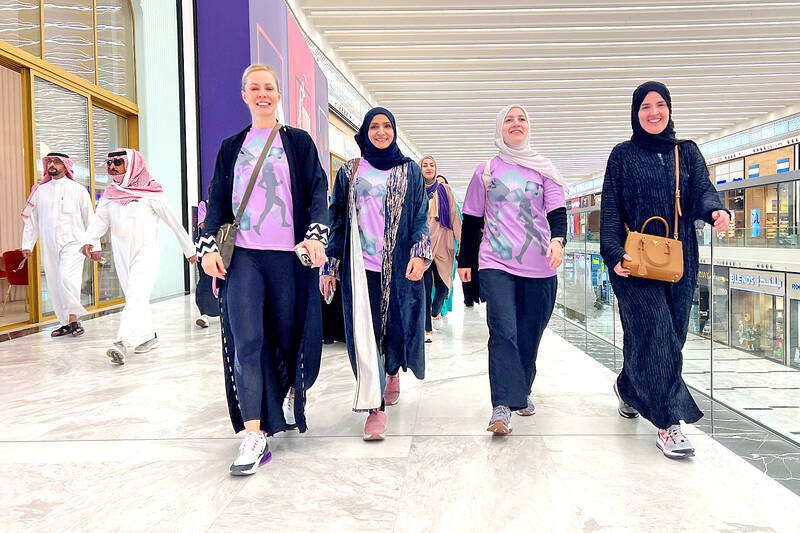The shops have not yet opened, but the air-conditioned concourse of a Riyadh shopping mall is crowded anyway — a haven for walkers and joggers grateful for somewhere cool to exercise.
The early-morning crowd includes 55-year-old engineer Mohammed Sultan, in a white T-shirt and black trainers, doing laps around the mall trailed by his niqab-wearing wife.
“It’s too hot outside to exercise. The weather here is cold and does not cause thirst,” Sultan says, noting that even in October, the end of the hot period in Saudi Arabia, daytime temperatures can still approach 40 degrees Celsius.

Photo: AFP
“Walking in gyms (on a treadmill) is very boring,” he adds with a laugh.
It is a scene replicated daily in malls across the Saudi capital, highlighting how a growing interest in physical fitness in the Gulf kingdom has collided with a dearth of suitable spaces for working out.
Long popular in the US, another car-centric country with an obesity problem, mall-walking is increasingly becoming a Saudi sport.
Roughly one in five Saudi adults is obese, according to an in-depth study published by the World Bank last year that described the issue as “alarming.”
To help bring that percentage down, the Saudi Sports for All Federation now organizes races such as the Riyadh Marathon, which this year drew thousands of runners onto the capital’s streets.
But such events are fairly irregular, and new gyms sprouting up in Riyadh often charge steep fees — a turn-off for Saudis who spurn fancy machines and simply need space to stretch their legs.
Officials have begun work on a 135km Sports Boulevard in the capital featuring foot, cycle and horse-riding paths. However that project — billed by organizers as “a green spine through the city” with “cooling water features” and shaded football pitches — is still years from completion.
That makes malls “the only option” for many people — at least for now, says Australian expat Zuzana Kalous, who formed a women’s walking group in Riyadh in 2020 that meets four times per week in different shopping centers.
“The mall is safe for women, air-conditioned and controlled. No pollution, no dust, no traffic,” she says as more than 20 members of her group jog past storefronts one recent morning.
The contained environment also guarantees people can exercise even in less-than-ideal weather, like spring sandstorms or winter rains, says Saudi nutritionist Laila al-Rifai, a member of Kalous’s group.
“Commercial centers are the ideal solution to continue walking at any time of the day, at any time of year,” she says.
Hassan Merhi, a Lebanese fitness trainer based in Riyadh, encourages his clients to walk outdoors as much as possible, noting that most studies show it offers a better workout than staying inside.
“It helps burn fat faster and reduces stress,” he says.
But Batoul Zind al-Hadid, a 41-year-old from Syria, says a mall walk is “excellent for those who are still feeling out their first steps.”
Not only does it tend to be more social, with groups gathered together in the same space, it also allows her to stay on top of the latest fashion trends by studying the display windows.
It is, she says, “a more comprehensive and entertaining experience.”

On April 26, The Lancet published a letter from two doctors at Taichung-based China Medical University Hospital (CMUH) warning that “Taiwan’s Health Care System is on the Brink of Collapse.” The authors said that “Years of policy inaction and mismanagement of resources have led to the National Health Insurance system operating under unsustainable conditions.” The pushback was immediate. Errors in the paper were quickly identified and publicized, to discredit the authors (the hospital apologized). CNA reported that CMUH said the letter described Taiwan in 2021 as having 62 nurses per 10,000 people, when the correct number was 78 nurses per 10,000

As we live longer, our risk of cognitive impairment is increasing. How can we delay the onset of symptoms? Do we have to give up every indulgence or can small changes make a difference? We asked neurologists for tips on how to keep our brains healthy for life. TAKE CARE OF YOUR HEALTH “All of the sensible things that apply to bodily health apply to brain health,” says Suzanne O’Sullivan, a consultant in neurology at the National Hospital for Neurology and Neurosurgery in London, and the author of The Age of Diagnosis. “When you’re 20, you can get away with absolute

May 5 to May 11 What started out as friction between Taiwanese students at Taichung First High School and a Japanese head cook escalated dramatically over the first two weeks of May 1927. It began on April 30 when the cook’s wife knew that lotus starch used in that night’s dinner had rat feces in it, but failed to inform staff until the meal was already prepared. The students believed that her silence was intentional, and filed a complaint. The school’s Japanese administrators sided with the cook’s family, dismissing the students as troublemakers and clamping down on their freedoms — with

As Donald Trump’s executive order in March led to the shuttering of Voice of America (VOA) — the global broadcaster whose roots date back to the fight against Nazi propaganda — he quickly attracted support from figures not used to aligning themselves with any US administration. Trump had ordered the US Agency for Global Media, the federal agency that funds VOA and other groups promoting independent journalism overseas, to be “eliminated to the maximum extent consistent with applicable law.” The decision suddenly halted programming in 49 languages to more than 425 million people. In Moscow, Margarita Simonyan, the hardline editor-in-chief of the